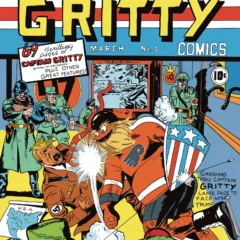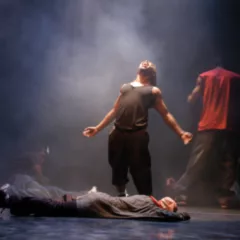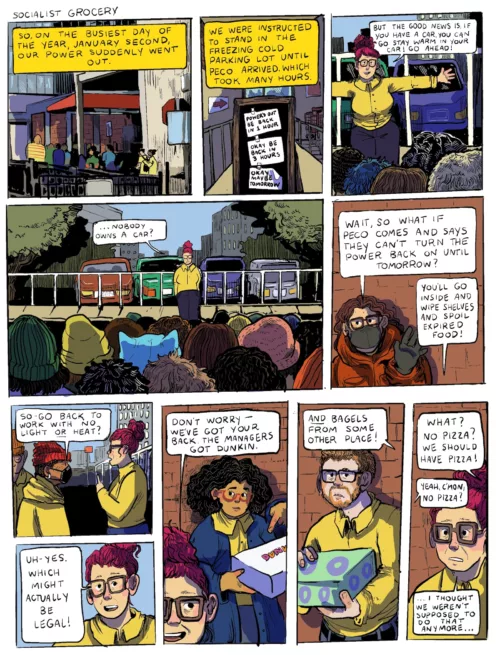At one point in its recent history, the Philadelphia Orchestra found its programming in a stale funk (too much Beethoven and not enough new music). But the fabulous Philadelphians are starting to surprise audiences more and more as the Yannick Nézet-Séguin years progress. The surprise in this case is a series of performances on March 30-April 1 that featured jazz-infused classical works. This is the first I’ve heard the Philadelphia Orchestra play jazz – there’s a first time for everything!
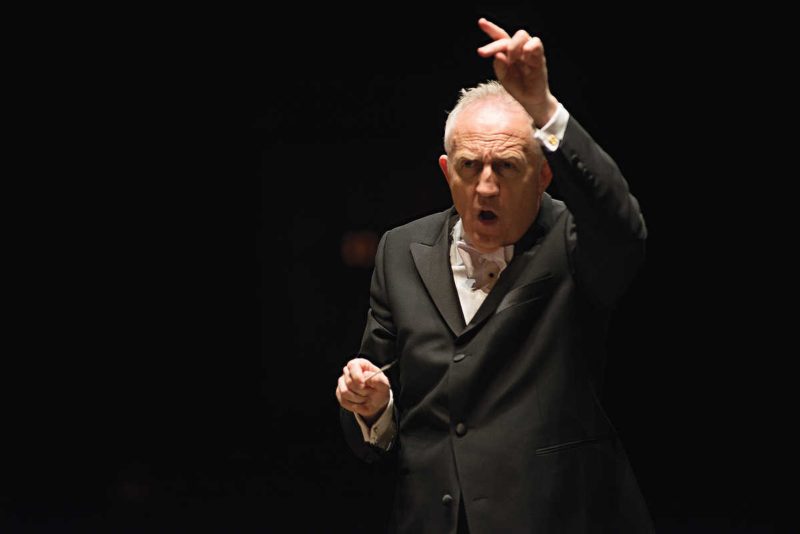
Bramwell Tovey once conducted a Bernstein piece with Bernstein in the house
The charming Bramwell Tovey was at the helm of this concert. Before the music began, Tovey joked with the audience to clap during the jazz works, but NOT during Dvorak’s 9th symphony. Some audience members clapped in between the Dvorak movements, just to be playful (audience members clapped after every movement when the symphony premiered in 1893).
The first work of the evening was Leonard Bernstein’s Prelude, Fugue, and Riffs for Solo Clarinet and Jazz Ensemble, a piece that Tovey once in 1986 conducted in the presence of the great maestro himself.
Bernstein’s jazz-inflected music and the use of the alto sax
Bernstein as a composer continued on the track that Gershwin left upon his death in 1937. All of Bernstein’s compositions have American music (jazz particularly) and a sense of the American character ingrained (the mix of ethnic voices in our “melting pot” culture, the spirit of democracy expressed in the “common man or woman” themes, the lack of aristocratic or authoritarian refrains). This is something that Gershwin also shares. The piece consists of a jazz ensemble in the round, including two alto saxophones of which, Tovey quipped it’s “the only time you’ll hear an alto saxophone in the Philadelphia Orchestra this year.” The alto saxophone is a signature voice in jazz music and the most “classical friendly” of the saxophone voices, which range from tenor to bass. In a general sense, the saxophone is traditionally a jazz instrument and less of a fixture in a classical setting.
Principal Clarinetist Ricardo Morales was the clarinet soloist, floating with smooth and crisp phrases that were originally written for the clarinet king himself, Benny Goodman. The brass flourishes throughout the composition almost sounded like a precursor to perhaps Bernstein’s most significant work, West Side Story (which premiered 8 years after).
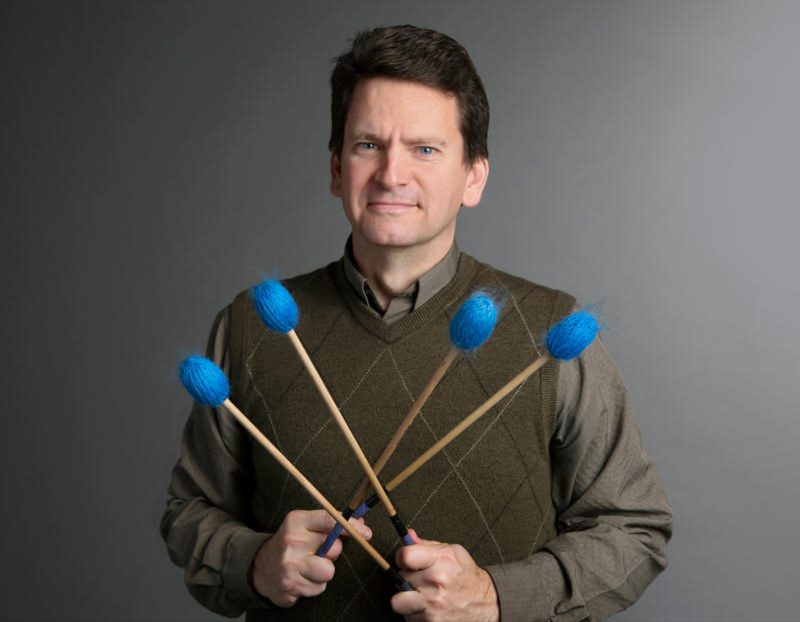
Pat Metheny’s Imaginary Day orchestrated into a tour de force percussion piece
Principal percussionist Chris Deviney is such an admirer of jazz guitarist and composer Pat Metheny that he decided to orchestrate three tunes from Metheny’s much-lauded Imaginary Day into a world premiere duo concerto. Playing the piece were Deviney on vibraphone and She-e Wu on marimba, and they are both dazzling players – showing off the colors of their instruments with exquisite precision.
Have you ever imagined the Philadelphia Orchestra having background singers? Hell, if Diana Ross can have background singers then so should our Orchestra. In the Metheny concerto, the handsome pair of tenors Michael Jones and Daniel Schwartz filled in the melodies with lyrics that didn’t always cut through the massive sound of the Orchestra (although their voices came through wonderfully in “Across the Sky”).
Out of the three movements, “Across The Sky” was my favorite. There was a romantic bossa nova feel captured in Deviney’s orchestration that brought me back to the delightful music of Henry Mancini. The audience was so receptive to the Metheny concerto that the orchestra played another Metheny tune, the mesmerizing “Letter from Home”, as an encore.
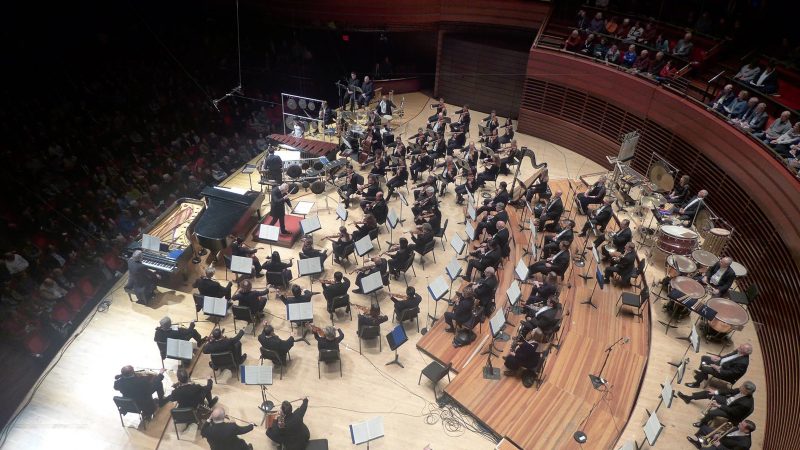
Negro Spiritual refrains in Dvorák’s New World Symphony
The second half of the program was saved for Dvorak’s Symphony No. 9 in E Minor (“From the New World”), one of the composer’s most recognizable works. The first movement begins with a theme from the violas and cellos that crosses into a lively Allegro section with the horns carrying the torch. The second movement begins with a very famous English horn melody (even non-classical listeners would know it) that evokes yet another American treasure–the Negro Spiritual. The 3rd movement is Dvorak’s answer to the second movement of Beethoven’s 9th Symphony, in its opening notes and form. The final movement begins with an insistent repeat-motive of two notes that John Williams would later develop into his Jaws movie score. When it comes to paying homage to a past composer’s great contribution, none sums it up than the old adage, “Lesser artists borrow, great artists steal.”
All in all, the program served as a look at American music through the lens of two Americans of the 20th Century and a European of the 19th Century. From Bernstein’s Prelude (1949) and Metheny’s Imaginary (1977) to Dvorak’s New World Symphony (1893) the sense was of American music swinging to its own beat and acknowledging its debt to African American and other ethnic cultures.
More information available on this performance and the remainder of the Philadelphia Orchestra’s 2016-17 season (as well as their intriguing 2017-18 season).


